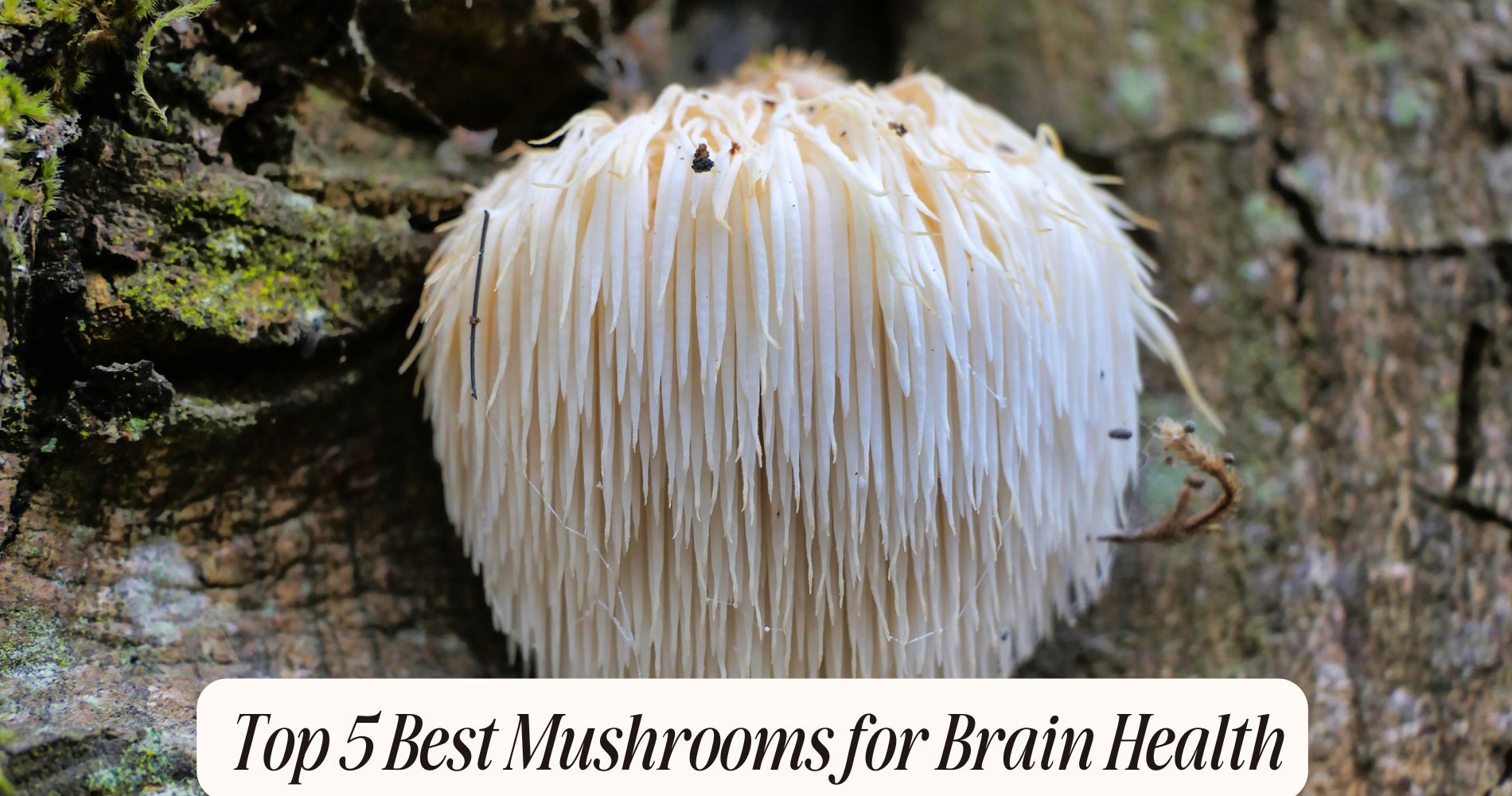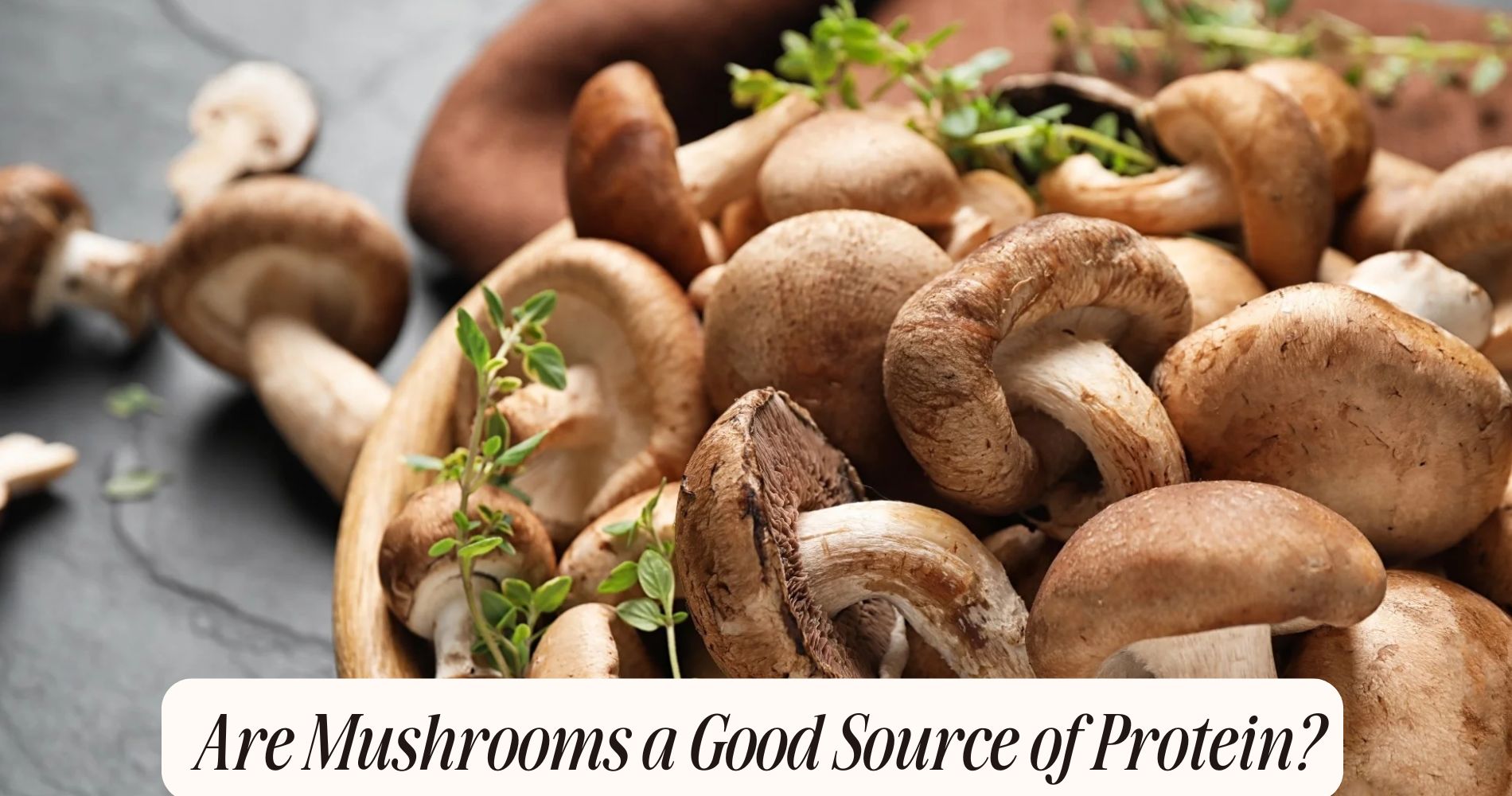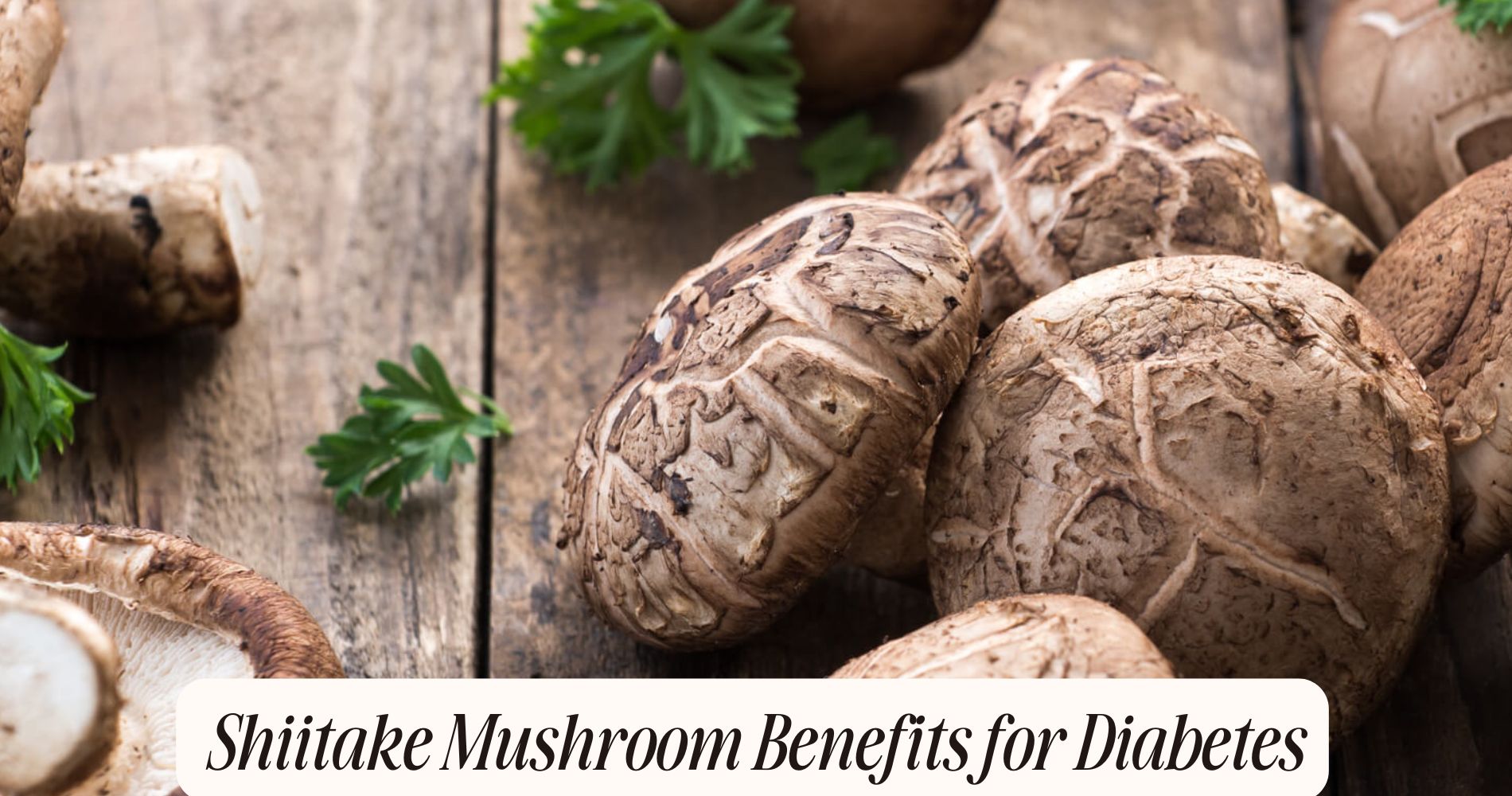If you’re searching for the best mushrooms for brain health, these top five are worth adding to your routine. Lion’s Mane stimulates nerve growth and enhances memory, while Reishi improves mood and promotes restful sleep—both essential for mental clarity. Chaga offers powerful antioxidants that combat inflammation, potentially lowering the risk of neurodegenerative issues. Cordyceps boosts oxygen flow to the brain, improving focus and mental performance. Lastly, Shiitake provides antioxidants and B vitamins that support brain function and sustained energy. Integrating these mushrooms into your diet can bring noticeable cognitive benefits. Keep reading to explore the best ways to incorporate them into your daily life!

Top 5 Best Mushrooms for Brain Health
Lion's Mane Mushroom
Lion's Mane mushroom, known scientifically as Hericium erinaceus, has gained attention for its potential benefits on brain health. This unique fungus stands out due to its neuroprotective properties, which may support cognitive enhancement.
Studies suggest that Lion's Mane stimulates the production of nerve growth factor (NGF), a protein essential for the growth, maintenance, and survival of neurons. By promoting NGF synthesis, it helps in repairing damaged neurons and enhancing overall cognitive function.
You might find it interesting that some research indicates Lion's Mane could improve memory and focus. In a study involving older adults, those who consumed Lion's Mane supplements showed significant improvements in cognitive function compared to a placebo group. This suggests that incorporating Lion's Mane into your diet could potentially mitigate age-related cognitive decline.

Additionally, its antioxidant properties may help protect brain cells from oxidative stress, further contributing to its neuroprotective effects.
If you're looking for natural ways to boost your brain health, consider adding Lion's Mane mushroom to your routine. Whether in supplement form or as a culinary ingredient, this mushroom could be a valuable ally for your cognitive well-being.
Reishi Mushroom
Reishi mushroom, scientifically known as Ganoderma lucidum, is often celebrated for its potential benefits on brain health and overall well-being. This powerful adaptogen has been linked to improved cognitive function, reduced anxiety, and enhanced mood.
Research suggests that reishi may help protect against neurodegenerative diseases, thanks to its antioxidant properties that combat oxidative stress in the brain.
When considering reishi benefits, it's important to note that this mushroom can also promote restful sleep, which is fundamental for cognitive clarity and memory retention. By improving your sleep quality, you're likely to experience better focus and mental performance during the day.

For effective use, the recommended reishi dosage typically ranges from 1.5 to 9 grams of dried mushroom per day, depending on your individual needs and health goals. You can consume it in various forms, including powders, capsules, or teas.
However, always consult with a healthcare professional before starting any new supplement regimen, especially if you're on medication or have existing health conditions.
Chaga Mushroom
Chaga mushroom, scientifically known as Inonotus obliquus, is another powerful fungus that can support brain health. Rich in antioxidants, particularly melanin, chaga can help combat oxidative stress, which is essential for maintaining cognitive function.
Research suggests that the anti-inflammatory properties of chaga may also contribute to its neuroprotective effects, potentially reducing the risk of neurodegenerative diseases.
Incorporating chaga into your diet is easy and versatile. You can enjoy chaga benefits by brewing it into a tea, which not only offers a soothing experience but also maximizes its health properties.
Simply steep chaga chunks or powder in boiling water for 15-20 minutes, and you've got a nutrient-packed drink ready to enhance your brain power.
You can also experiment with chaga recipes, such as adding powdered chaga to smoothies, oatmeal, or baked goods. This way, you're not only boosting your brain health but also enjoying a delicious treat.
Cordyceps Mushroom
Have you ever wondered how Cordyceps mushrooms can enhance your brain health? These fascinating fungi, traditionally used in Chinese medicine, offer impressive cordyceps benefits that can support cognitive function. Research shows that Cordyceps can increase oxygen levels in the brain, which is essential for ideal performance.
One of the key ways Cordyceps contributes to cognitive enhancement is through its ability to improve energy production in brain cells. This boost in energy can lead to sharper focus, better memory, and increased mental clarity.
Additionally, Cordyceps contains antioxidants that combat oxidative stress, a factor that can negatively impact brain health and cognitive abilities.

Moreover, studies have suggested that Cordyceps can help regulate blood sugar and inflammation, both of which are linked to cognitive decline. By promoting overall brain health, Cordyceps can help you maintain sharp thinking as you age.
Incorporating Cordyceps into your diet, whether through supplements or culinary uses, may be a great way to access these brain-boosting benefits.
Shiitake Mushroom
When it comes to supporting brain health, Shiitake mushrooms stand out for their impressive nutritional profile. They're rich in antioxidants, particularly ergothioneine, which helps protect your brain cells from oxidative stress. This protection may play a role in reducing cognitive decline as you age.
Shiitake mushrooms also contain essential vitamins and minerals, including B vitamins, which are crucial for energy production and brain function. The presence of compounds like lentinans may enhance your immune system, contributing to overall well-being and potentially benefiting brain health indirectly.
Incorporating Shiitake mushrooms into your diet is easy and enjoyable thanks to their culinary uses. You can sauté them, add them to soups, or even toss them into stir-fries. Their rich, umami flavor enhances a variety of dishes, making them a versatile addition to your meals.
Boost Brainpower with SUPER MUSHROOM GUMMIES
Unlock the cognitive benefits of the best mushrooms for brain health with SUPER MUSHROOM GUMMIES from Well Gummies. Featuring 10 powerful mushrooms, including brain-boosting varieties like Lion’s Mane and Reishi, these vegan-friendly gummies enhance focus, mental clarity, and calm energy without the jitters or crash.
With a wild berry flavor that tastes just like candy, these gummies are an easy, delicious way to fuel your mind and body naturally. Add SUPER MUSHROOM GUMMIES to your daily routine for sharper focus, better memory, and balanced energy all day long.
Frequently Asked Questions
Can Mushrooms Be Consumed Raw for Brain Health Benefits?
You can consume some mushrooms raw for brain health benefits, but make certain they're safe. Raw mushroom safety varies, and their nutritional content might be better when cooked. Always research specific types before consuming them raw.
Are There Any Side Effects of Consuming Medicinal Mushrooms?
Yes, there can be side effects from consuming medicinal mushrooms. You should be aware of medicinal mushroom safety, as some people may experience mushroom allergy concerns, leading to reactions like digestive upset or skin issues. Always consult a professional.
How Often Should I Consume Mushrooms for Optimal Brain Health?
To boost brain health, consume mushrooms several times weekly. Experiment with various cooking methods like sautéing or roasting. Aim for diverse serving suggestions, incorporating them into soups, salads, or stir-fries to maximize benefits.
Can Mushroom Supplements Replace a Healthy Diet for Brain Function?
Mushroom supplements can't replace a balanced diet for cognitive enhancement. While various mushroom varieties support brain health, they work best alongside whole foods, providing essential nutrients that supplements alone can't deliver for ideal brain function.
Are There Specific Mushrooms Recommended for Different Age Groups?
Certain mushroom varieties offer age-specific benefits. For instance, younger adults might benefit from Lion's Mane for cognitive support, while older adults may find Reishi helpful for stress relief and improved sleep. Choose wisely for ideal health!
Conclusion
Incorporating mushrooms like Lion's Mane, Reishi, Chaga, Cordyceps, and Shiitake into your diet can greatly benefit your brain health. These fungi offer a range of neuroprotective properties, enhance cognitive function, and may even support mood regulation. Whether you enjoy them in dishes, as supplements, or in teas, adding these powerful mushrooms to your routine can be a simple yet effective way to support your cognitive well-being. Don't underestimate the potential of these natural brain boosters!




